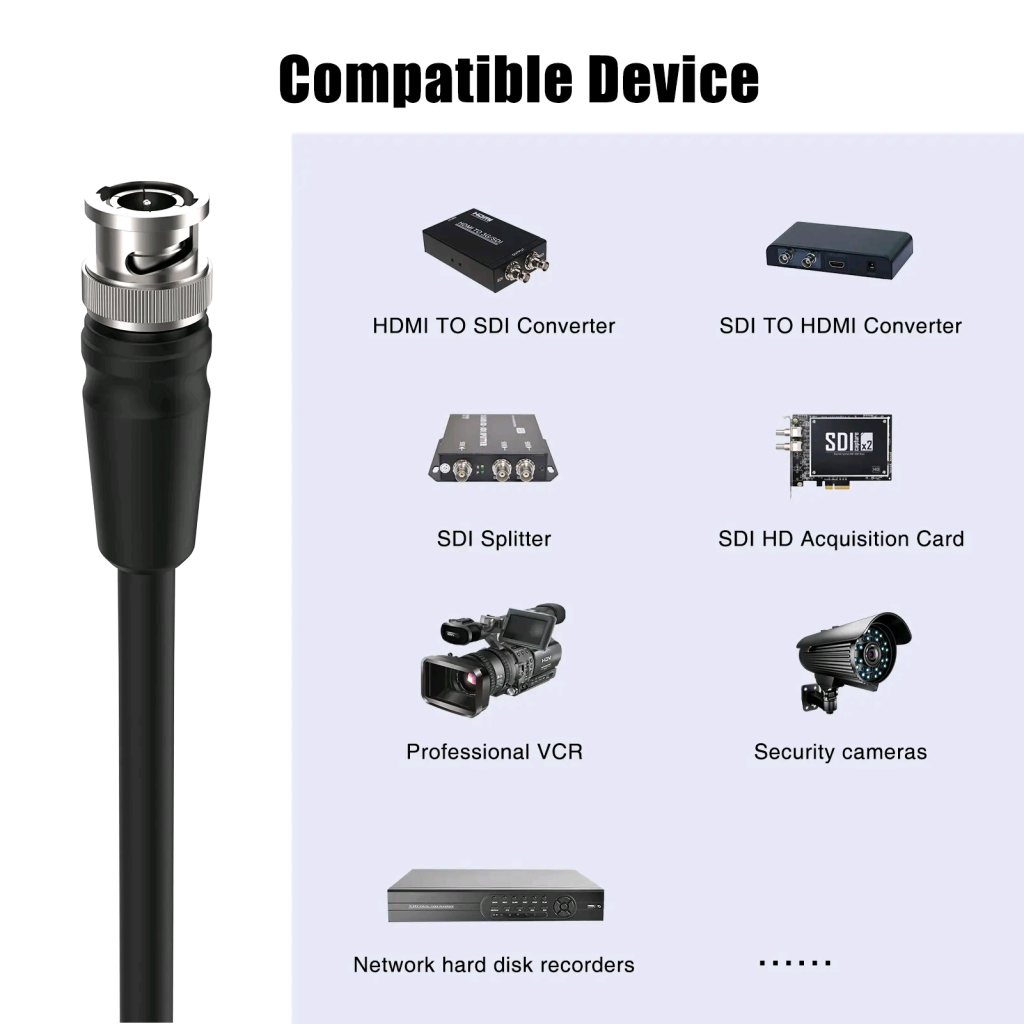When it comes to customize coaxial cables, quality and performance are essential for achieving reliable and efficient data transmission. These cables play a crucial role in various industries, from telecommunications to broadcasting, and ensuring their durability and transmission capability is vital. In this article, we will explore the key factors to consider when evaluating the quality of custom coaxial cables and how to check their durability and transmission capabilities. Additionally, we will highlight the benefits of working with a trusted custom coaxial cable manufacturer for your specific need
Evaluating the Material Quality of Custom Coaxial Cables
he quality of materials used in customize coaxial cable assemblies is one of the most critical factors in determining their overall performance. From the conductor to the insulation, each component plays a role in ensuring optimal signal transmission.
Importance of Conductor Material:
The conductor is the core element of any coaxial cable, responsible for transmitting the electrical signal. High-quality conductors are typically made from copper or a copper alloy, as these materials provide excellent conductivity. Some custom coaxial cables use materials like gold or silver-plated copper for better signal integrity. When assessing a custom coaxial cable, ensure that the conductor is made of high-grade material that guarantees low resistance and efficient signal transmission.
Choosing the Right Insulation:
The insulation layer surrounding the conductor plays a key role in minimizing signal loss and protecting the cable from external interference. Custom coaxial cables often use materials like polyethylene, Teflon, or foam for insulation. The thickness and dielectric constant of the insulation material impact the cable’s ability to maintain signal quality over long distances. A high-quality custom coaxial cable should have properly selected insulation that prevents signal degradation and reduces electromagnetic interference (EMI).
Shielding for Interference Protection:
The shielding around the cable is another essential factor that affects signal transmission and durability. Good shielding prevents external EMI and crosstalk, which can distort the signal. Look for custom coaxial cable assemblies that feature multiple layers of shielding, such as copper braids, foil shields, or both, to ensure maximum protection from interference.
By paying attention to the quality of materials used, you can determine whether the custom coaxial cables will deliver the performance and durability you need for your application.
Testing the Durability of Custom Coaxial Cables
The transmission capability of coaxial cables is determined by their ability to transmit data or signals without significant loss, distortion, or delay. Several factors influence the transmission quality, and it’s essential to evaluate these when choosing custom coaxial cables.
Signal Loss and Attenuation:
Attenuation refers to the loss of signal strength as it travels through the coaxial cable. The amount of attenuation depends on the cable’s design, including the materials used and the thickness of the dielectric layer. High-quality custom coaxial cables are designed to minimize signal loss, allowing the signal to travel longer distances without degradation. You can assess the transmission capability by checking the cable’s attenuation value, typically measured in decibels per meter (dB/m). A lower attenuation value indicates better transmission quality.
Bandwidth and Frequency Response:
The bandwidth of a coaxial cable is the range of frequencies it can effectively transmit without significant signal loss. High-quality customize coaxial cables should support a wide range of frequencies, depending on the application. For instance, cables used in high-speed data transmission, such as broadband or cable TV, must be capable of handling high-frequency signals without distortion. When assessing the transmission capabilities of custom coaxial cables, ensure that the cable is designed to handle the required bandwidth for your application.
Return Loss and Reflection:
Another factor to consider is return loss, which measures the amount of signal reflected back towards the source due to impedance mismatches in the cable. Custom coaxial cables with low return loss ensure that most of the signal is transmitted without reflection, resulting in cleaner and more accurate data transmission. A high-quality cable should have an appropriate impedance (usually 50 or 75 ohms) to match the system’s requirements, minimizing reflection and signal degradation.
By evaluating these transmission characteristics, you can determine if a custom coaxial cable will meet your specific performance needs.
Assessing the Transmission Capabilities of Custom Coaxial Cables
The transmission capability of coaxial cables is determined by their ability to transmit data or signals without significant loss, distortion, or delay. Several factors influence the transmission quality, and it’s essential to evaluate these when choosing custom coaxial cables.
Signal Loss and Attenuation:
Attenuation refers to the loss of signal strength as it travels through the coaxial cable. The amount of attenuation depends on the cable’s design, including the materials used and the thickness of the dielectric layer. High-quality custom coaxial cables are designed to minimize signal loss, allowing the signal to travel longer distances without degradation. You can assess the transmission capability by checking the cable’s attenuation value, typically measured in decibels per meter (dB/m). A lower attenuation value indicates better transmission quality.
Bandwidth and Frequency Response:
The bandwidth of a coaxial cable is the range of frequencies it can effectively transmit without significant signal loss. High-quality custom coaxial cables should support a wide range of frequencies, depending on the application. For instance, cables used in high-speed data transmission, such as broadband or cable TV, must be capable of handling high-frequency signals without distortion. When assessing the transmission capabilities of custom coaxial cables, ensure that the cable is designed to handle the required bandwidth for your application.
Return Loss and Reflection:
Another factor to consider is return loss, which measures the amount of signal reflected back towards the source due to impedance mismatches in the cable. Custom coaxial cables with low return loss ensure that most of the signal is transmitted without reflection, resulting in cleaner and more accurate data transmission. A high-quality cable should have an appropriate impedance (usually 50 or 75 ohms) to match the system’s requirements, minimizing reflection and signal degradation.
By evaluating these transmission characteristics, you can determine if a customize coaxial cable will meet your specific performance needs.
Why Choose a Trusted Custom Coaxial Cable Manufacturer?
Choosing the right customize coaxial cable manufacturer is crucial for ensuring high-quality products that meet your specific requirements. A reliable manufacturer can provide not only high-performance custom coaxial cables but also offer valuable support throughout the design and production process.
Expertise and Experience:
A trusted manufacturer will have extensive experience in producing custom coaxial cables that meet the latest industry standards. They should be able to offer guidance on selecting the right materials, components, and designs based on your needs, whether it’s for data transmission, RF applications, or video signals.
Custom Solutions for Your Needs:
Working with a reputable custom coaxial cable supplier allows you to tailor the cables to your exact specifications. Whether you need a specific length, connector type, or shielding solution, a good manufacturer will work with you to design the perfect custom coaxial cable assemblies for your application. They should also be able to conduct thorough testing and quality control checks to ensure that each cable performs reliably and consistently.
Customer Support and After-Sales Service:
A trusted supplier provides excellent customer support and after-sales service, ensuring that any issues with your custom coaxial cables are addressed quickly and effectively. Look for manufacturers who offer warranties, technical support, and easy communication channels to ensure that you can rely on them throughout the lifecycle of your cables.
Conclusion
The quality, durability, and transmission capabilities of customize coaxial cables are essential factors to consider when selecting cables for your applications. By focusing on the material quality, environmental resistance, mechanical strength, and transmission performance, you can ensure that your customize coaxial cables meet your needs and provide reliable, high-performance results. Working with a trusted custom coaxial cable manufacturer and supplier will help you achieve the best possible outcome, with tailored solutions and exceptional customer service.

